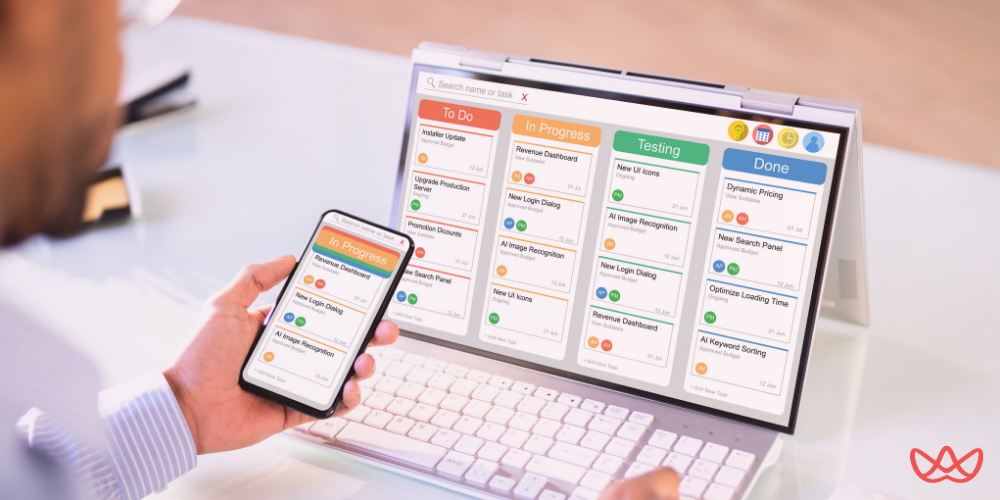Overburdened founders and growing SMBs often struggle with missed deadlines and chaotic workflows as they expand. The demand for professional project management skills is rising, but hiring full-time project managers can be costly for smaller companies. The project management agency model offers a strategic solution, providing on-demand access to skilled professionals that aligns with trends for 2026, such as remote collaboration, nearshore talent, and fractional executive roles.

What Is a Project Management Agency?
A project management agency connects businesses with qualified project managers who can handle specific projects or ongoing tasks on a contract basis. Unlike freelancers or in-house managers, these agencies offer skilled professionals with proven success across various sectors. This flexible approach allows businesses, especially startups and small to medium-sized enterprises, to access specialized knowledge without the costs associated with full-time employees.
Why Partner with a Project Management Agency?
Savvy organizations are recognizing that partnering with project management agencies offers significant advantages over traditional hiring, providing specialized expertise without the challenges of full-time recruitment. These collaborations give access to pre-screened experts who can swiftly impact project outcomes and deliver the flexibility that modern businesses need.
Access to Specialized Project Management Expertise
Project management firms build specialized networks of experts with in-depth knowledge in sectors like SaaS development and fintech compliance. These professionals bring established methodologies and industry best practices that generalist managers may lack. Additionally, fractional staffing enables companies to access senior-level expertise for specific projects or ongoing strategies without the associated costs of full-time hires.
Time and Cost Efficiency
Agencies streamline hiring by providing quick access to skilled project managers who can start within days, reducing recruitment timelines by 40-60%. This efficiency also cuts costs by eliminating recruitment expenses, benefits packages, and losses from hiring mistakes that can impact productivity and require rehires.
Industry-Specific Knowledge & Networks
Top project management firms specialize in specific industries, providing experts who understand the unique sector challenges, such as compliance in healthcare or supply chain management in manufacturing. These project managers establish connections with vendors and tools, streamlining project implementation and reducing onboarding challenges.
Streamlined Talent Screening & Selection
Agencies conduct thorough vetting processes, including technical evaluations and client reference checks, which busy founders often lack the time to perform. This screening reduces the recruitment time by 70-80% and ensures only skilled professionals with proven records are presented for consideration.
How a Project Management Agency Works
Understanding the project management agency engagement process helps companies prepare for effective collaborations and set realistic expectations for their projects. The typical workflow ensures that a suitable project manager is aligned with your project needs and organizational values.
PhaseDescriptionTimelineKey ActivitiesDeliverablesConsultation & Requirements GatheringDeep dive into project scope, team structure, and success criteria.1-2 days.Stakeholder interviews, project assessment, skill requirement definition, and budget discussion.Detailed project brief, PM profile requirements, and engagement terms.Sourcing & Shortlisting CandidatesIdentify and pre-screen qualified project managers from the agency network.2-3 days.Database search, candidate outreach, initial screening calls, and availability confirmation.Curated shortlist of 3-5 qualified candidates with profiles and portfolios.Candidate Vetting & EvaluationComprehensive assessment of technical skills, cultural fit, and project alignment.3-5 days.Technical interviews, methodology assessment, reference checks, and client presentation.Detailed candidate evaluations, recommendation rankings, and interview summaries.Onboarding & Project HandoffSmooth transition of selected PM into project role with full context.1-2 days.Contract finalization, project documentation handover, team introductions, and setup of tool access.Signed agreements, project kickoff meeting, and established communication protocols.
Consultation & Requirements Gathering
The engagement begins with discovery sessions where agencies assess your project requirements, timeline, and technical specs. This involves discussions on preferred project management tools, such as Jira, ClickUp, or Asana, as well as communication styles and success metrics for selecting candidates.
Key consultation elements include:
- Defining project scope: Establishing clear limits, deliverables, and criteria for success.
- Mapping out the timeline and milestones: Identifying key deadlines and requirements for each project phase.
- Evaluating the technical stack: Assessing necessary integrations, software expertise, and preferred methodologies.
- Analyzing team structure: Identifying stakeholders, understanding reporting relationships, and setting communication protocols.
Sourcing & Shortlisting Candidates
Agencies utilize their carefully selected talent pools to find project managers whose backgrounds align with your unique needs and industry landscape. This procedure involves pairing candidates based on their technical abilities, industry expertise, project complexity, and indicators of cultural compatibility.
Sourcing activities encompass:
- Talent database exploration: Tapping into a pool of pre-screened candidates who possess the necessary experience and are available.
- Network engagement: Utilizing professional contacts and industry relationships to meet specific requirements.
- Competency alignment: Evaluating candidates' skills about project demands and methodological preferences.
- Initial assessment: Conducting preliminary interviews to gauge interest, availability, and alignment with basic qualifications.
Candidate Vetting & Evaluation
Thorough evaluation processes ensure that only the most suitable candidates are selected for client review. This stringent screening process encompasses technical evaluations, behavioral interviews, and reference checks to confirm both skill set and cultural fit.
Evaluation components include:
- Assessment of technical skills: Understanding of project management methodologies, proficiency with tools, and ability to solve problems.
- Evaluation of cultural compatibility: Alignment of values, style of communication, and preferences for teamwork.
- Verification of references: Feedback from past clients, rates of project success, and validation of professional reputation.
- Evaluation of soft skills: Leadership potential, management of stakeholders, and ability to resolve conflicts.
Onboarding & Project Handoff
Seamless transitions enable new project managers to quickly make a positive impact on project success without disrupting current workflows. This stage involves detailed briefings, granting access to systems, and introducing stakeholders to facilitate faster integration.
Onboarding support includes:
- Review of project documentation: In-depth update on the current situation, obstacles, and strategic goals.
- Coordination for system access: Configuration of tools, setting permissions, and integrating with current workflows.
- Introductions to stakeholders: Official presentations to essential team members, clients, and external partners.
- Planning for initial milestones: Jointly establishing goals and identifying immediate priorities for a smooth transition.
When Should You Consider a Project Management Agency?
Growing businesses often face critical moments when their project management strategies fail to maintain quality and meet deadlines. These situations underscore the importance of skilled project management in preventing costly mistakes and ensuring the successful implementation of strategic initiatives.
Common scenarios that indicate you need a project management agency include:
- Frequent scope changes and budget overruns: Projects often exceed initial estimates due to ineffective boundary management and insufficient change control measures.
- Missed deadlines impacting client relationships: Failure to deliver promised features or services on schedule influences customer satisfaction and revenue.
- Lack of insight into project advancement: Founders are spending too much time monitoring status updates instead of concentrating on strategic business growth.
- Preparation for MVP or product launch: There is a need for organized go-to-market strategies, timeline management, and alignment among cross-functional teams.
- Challenges in scaling the development team: Overseeing multiple developers, contractors, or offshore teams without adequate coordination and communication protocols.
- Difficulties in coordinating remote teams: Maintaining productivity and accountability among distributed teams across different time zones.
- Conflicts in resource allocation Arise When Several projects compete for the same team members, often without clear prioritization or adequate capacity planning.
- Issues with quality control: Deliverables failing to meet standards due to insufficient review processes and milestone checkpoints.
What to Look for When Choosing a Project Management Agency
Selecting the right project management agency requires a careful evaluation of factors that impact project success and alignment with organizational objectives. The best agencies combine industry expertise, strong leadership, extensive professional networks, and clear communication to build trust and achieve results.
Proven Industry Experience
When assessing agencies, focus on their industry history and request case studies and client feedback that demonstrate success. Look for those with experience in projects similar in scope and complexity to yours, as this can facilitate quicker onboarding and better forecasting of potential challenges.
Strong Leadership & Problem‑Solving Team
Seek project managers who demonstrate strategic thinking beyond task management, focusing on proactive risk management, optimizing team dynamics, and resolving stakeholder conflicts. The best PMs act as organizational leaders, adept at handling complex interpersonal issues while ensuring project progress and quality.
Broad Network & Market Insight
Select agencies that offer connections to industry networks, new tools, and innovative methodologies to ensure your projects remain competitive and effective. Leading agencies prioritize ongoing education and sustain partnerships with vendors, specialists, and industry experts to enhance their projects through knowledge sharing and access to resources.
Communication Skills & Transparency
Focus on agencies that are proficient in asynchronous communication, offer clear reporting to stakeholders, and uphold transparent billing methods that do not include hidden fees or unexpected charges. Practical communication skills facilitate seamless collaboration across different time zones and team configurations while fostering trust through regular and honest updates on project progress.
Project Manager’s Role: What Is 90% of Their Job?
Consider project managers to be like air traffic controllers for your business projects; they don’t pilot the planes, but they ensure that everything arrives safely and on time. Although many entrepreneurs picture PMs as those who spend their time building detailed Gantt charts and marking tasks as complete, the truth is much more complex and centered on relationships.
Here's the unexpected reality: 90% of what a project manager does is not solely focused on managing projects but involves overseeing people, communication, and the hidden chaos that can disrupt any initiative. Similar to a proficient conductor guiding an orchestra, they may not play each instrument, but ensure every section enters at the appropriate time to produce harmony.
Need a project manager to keep your business initiatives on track? Get one in no time with Floowi today.
The Real PM Job Breakdown:
Communication & Stakeholder Alignment: 35%Risk Management & Contingency Planning: 20%- Translating between technical teams and business stakeholders. - Managing expectations and delivering difficult conversations. - Facilitating meetings that move projects forward.- Anticipating what could go wrong and preparing alternatives. - Managing scope creep through diplomatic but firm boundary setting. - Monitoring team morale and addressing burnout before it impacts delivery.Problem-Solving & Unblocking: 25%Coordination & Process Optimization: 10%- Identifying bottlenecks before they become crises. - Resolving resource conflicts and priority disputes. - Finding creative solutions when original plans hit reality.- Actual project planning, timeline creation, and task management. - Tool implementation and workflow standardization. - Documentation and reporting that keep everyone informed.Strategic Planning & Vision Alignment: 10%- Ensuring tactical execution serves broader business objectives. - Recommending process improvements and efficiency gains. - Maintaining a long-term perspective while handling daily fires.
FAQs
What Is a Project Management Agency?
A project management agency is a dedicated service provider that links companies with qualified project management experts on a contractual basis. These agencies provide flexible access to skilled PMs who can manage particular projects, ongoing tasks, or strategic planning without the long-term obligations and overhead expenses associated with full-time employees.
What is 90% of a Project Manager’s Job?
About ninety percent of a project manager's responsibilities focus on communication, aligning stakeholders, and resolving issues rather than just tracking tasks. They spend most of their time interpreting information, managing expectations, removing barriers, and ensuring alignment on priorities to maintain project progress through relationship management and strategic coordination.
How Much Does Hiring a Project Management Agency Cost?
Project management agencies typically charge $75 to $150 per hour for skilled managers, with monthly retainers ranging from $5,000 to $15,000 or fixed-scope projects costing between $10,000 and $50,000. This approach can save 30-50% compared to hiring full-time managers, considering salary, benefits, and hiring costs while providing immediate access to specialized expertise.
Can an Agency Help With Remote or On-Site Projects?
Yes, contemporary project management firms excel in managing remote and hybrid projects, utilizing skilled project managers to coordinate distributed teams across different time zones. They leverage digital collaboration tools and asynchronous communication strategies to ensure smooth project execution, regardless of team location or working conditions.



.png)








.png)
